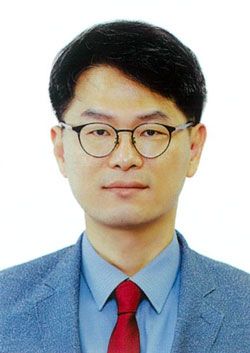
ITU’s top contributors: Republic of Korea
The Republic of Korea is among the leading contributors to the annual budget of the International Telecommunication Union (ITU), with a current commitment of 10 contributory units – equivalent to CHF 3.18 million (about KRW 4.4 billion or USD 3.3 million) each year.
As part of this special blog series on ITU’s top contributing Member States, ITU News interviewed Kim Seong-gyu, Director General of the International Cooperation Bureau at the Republic of Korea’s Ministry of Science and ICT.

Ministry of Science and ICT
Director General Kim has set out to enhance diplomatic cooperation on science and digital technologies to build mutual prosperity and ensure a better future for all. Before his appointment in May 2021, he served as Director General of the Radiation Emergency Bureau for the country’s Nuclear Safety and Security Commission.
Why does the Republic of Korea support ITU?
Instead of “support,” I would like to say the Republic of Korea is on a journey together with ITU.
As you are likely aware, the country has achieved dramatic information and communication technology (ICT) development in a short period of time, which in turn laid the foundation for accelerated economic and social development. I believe the Republic of Korea was able to achieve this because of sharing and standing by ITU’s core values and by acting accordingly.
I would like everyone around the world to be able to harness the same benefits as the Republic of Korea has reaped and enjoyed through ICT development in cooperation with ITU. As a responsible member of the international community, the Republic of Korea will continue to walk together with ITU and contribute to the effective use and expansion of ICTs in line with sustainable development.
How does the work of ITU work relate to your strategic initiatives in the broad field of ICTs?
ITU activities such as international technology standardization and radio resource management provide member countries with important criteria, along with crucial insights on establishing national policy directions for ICT development.
For example, the Republic of Korea was enabled to speed up its domestic research and development (R&D) on ICTs and industrialization by participating in diverse ITU activities related to standardization and management of radio resources. An especially exemplary case in this regard is our involvement in ITU on CDMA (code-division multiple access) and 5G technology, as well as the successful commercialization of these technologies for the first time in the world.
As new and emerging technologies and ICT-based services continue being developed and growing, ITU is expected to play a more important role than ever.

What specific benefits do you see from your work with ITU, and which ITU activities are most relevant to your country?
The Republic of Korea has high shares in the global markets for semiconductors, display systems, and mobile phones. It is also the leader in related technologies.
With the ICT industry evolving rapidly, we must continue identifying the trends in technology standards and participating in standard-setting activities. This means increasing the number of Korean experts involved in ITU standardization activities for new and emerging ICTs, including 5G, cloud computing, and quantum cryptography technology.
In June, the Republic of Korea presented its national vision for innovative future solutions – particularly through the publication of a report on trends in future 6G technologies. As these trends accelerate, we aim to engage in productive discussions on standardization and information-sharing with other ITU member countries.
Can you provide some examples of how new and emerging ICTs are helping to drive sustainable development in your country, your region, or around the world?
ICTs are regarded as an ideal growth engine for sustainable development, as they can avoid problems of resource depletion and environmental degradation while maintaining social and economic sustainability.
While they are growing faster than any other technology, ICTs can cement the convergence of different technologies. They are a driving force that keeps generating new technologies and services. This brings prosperity but also means a change to people’s lifestyles.
For example, the increasing convergence between artificial intelligence (AI) and data technologies and those of industries like health, security, and smart manufacturing will drive economic transformation and contribute to enhanced social development.
What do you see as the main ICT industry trends in the Republic of Korea?
The ICT industry makes up about 30 per cent of the country’s exports. Major export items include memory semiconductors (meeting 70 per cent of global demand), display tech, mobile phones, computers, and peripheral devices. Despite the global economic downturn and heightened uncertainty, the system-memory industry and small and medium-sized enterprises (SMEs) for computer-related manufacturing continue growing steadily.
As for medium-to long-term R&D, the government has established and implemented policies promoting AI, the metaverse, high-performance computing, quantum information technology, intelligent Internet of Things (IoT), and other technologies with huge potential to transform our daily lives and ways of working.
Which issues should ITU address as its highest priorities in the coming years?
Thanks to ICTs, we can access information faster and more conveniently in our daily lives and enjoy the benefits of an array of services. ICTs can further enrich our lives as a driving force for sustainable development.
However, as ICT development accelerates, the digital gap between regions, between countries, and between generations is also rapidly widening. Moreover, this situation has worsened amid COVID-19, with the heaviest effects of the pandemic being on the most vulnerable.
Ideally, “cold” technologies could create a “warm” world for all, with ICT tools becoming the gift of the modern world to ensure a better life for all the people of the world. ITU must continue to promote its cherished values of inclusive connectivity to ensure these values bear fruit in the long term.
How should ITU evolve to meet the changing needs of the ICT industry?
The ICT industry is an area where the pace of change is inherently fast. The changes have sped up even more due to the massive role of ICTs in responding to COVID-19 and the changing lifestyles in this situation. The shortening lifecycle of new technologies and services, continual technological advancement, and technology convergence are all major aspects of this.
To effectively address these rapid and complex changes, ITU needs to work robustly to maintain smooth coordination and cooperation among its three sectors – radiocommunication, standardization, and development – as well as with member countries.
Along with its 193 Member States, ITU encompasses over 900 companies large and small, academic and research institutions, and international and regional organizations engaged as sector members. In addition, I think ITU needs to steer the discussion on the forthcoming agenda through communication with experts from other international and private organizations.
Learn more in the backgrounder on how ITU is funded.
Image credit: kampon – stock.adobe.com
